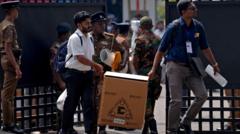Over 8,800 candidates represent a mix of 49 political parties and 284 independent groups competing for 225 parliamentary seats, although only about 1,000 have actively campaigned, according to Rohana Hettiarachchi from the People’s Action for Free and Fair Elections. Voting is scheduled from 07:00 to 16:00 local time (01:30 to 10:30 GMT), with results anticipated by Friday evening.
The impending elections follow a tumultuous period marked by hyperinflation, food and fuel shortages, and the resignation of former President Gotabaya Rajapaksa in 2022. The current president, Ranil Wickremesinghe, has managed to secure a $3 billion bailout from the International Monetary Fund (IMF). However, many citizens, including 26-year-old garment factory worker Manjula Devi, highlight that significant economic difficulties persist, with a notable increase in the poverty rate to 25.9% over the past four years.
Economist Raisa Wickrematunge pointed out that Sri Lanka's recovery from its 2022 economic crisis remains incomplete despite the IMF bailout. An alarming situation has seen public hospitals, such as the Sri Jayawardenapura general hospital, resorting to turning off lights and fans to manage mounting electricity costs. In light of these challenges, voters approach this election with a mix of hope and skepticism.
Analysts predict a fragmented outcome in the elections, making it challenging for President Anura Kumara Dissanayake's party, Janatha Vimukthi Peramuna (JVP), to enact significant reforms. With expectations of a multi-cornered contest, obtaining a two-thirds majority will likely necessitate coalition-building, complicating governance.
Despite the backdrop of economic turmoil, the election campaign has remained notably calm, with few reports of violence or abuse of resources. “Violence is negligible compared to previous elections. It will be peaceful elections,” Hettiarachchi stated, fostering a sense of cautious optimism for the polling day ahead. The outcome of these elections will likely play a significant role in shaping the trajectory of Sri Lanka's political landscape and its struggle for economic recovery.
The impending elections follow a tumultuous period marked by hyperinflation, food and fuel shortages, and the resignation of former President Gotabaya Rajapaksa in 2022. The current president, Ranil Wickremesinghe, has managed to secure a $3 billion bailout from the International Monetary Fund (IMF). However, many citizens, including 26-year-old garment factory worker Manjula Devi, highlight that significant economic difficulties persist, with a notable increase in the poverty rate to 25.9% over the past four years.
Economist Raisa Wickrematunge pointed out that Sri Lanka's recovery from its 2022 economic crisis remains incomplete despite the IMF bailout. An alarming situation has seen public hospitals, such as the Sri Jayawardenapura general hospital, resorting to turning off lights and fans to manage mounting electricity costs. In light of these challenges, voters approach this election with a mix of hope and skepticism.
Analysts predict a fragmented outcome in the elections, making it challenging for President Anura Kumara Dissanayake's party, Janatha Vimukthi Peramuna (JVP), to enact significant reforms. With expectations of a multi-cornered contest, obtaining a two-thirds majority will likely necessitate coalition-building, complicating governance.
Despite the backdrop of economic turmoil, the election campaign has remained notably calm, with few reports of violence or abuse of resources. “Violence is negligible compared to previous elections. It will be peaceful elections,” Hettiarachchi stated, fostering a sense of cautious optimism for the polling day ahead. The outcome of these elections will likely play a significant role in shaping the trajectory of Sri Lanka's political landscape and its struggle for economic recovery.



















